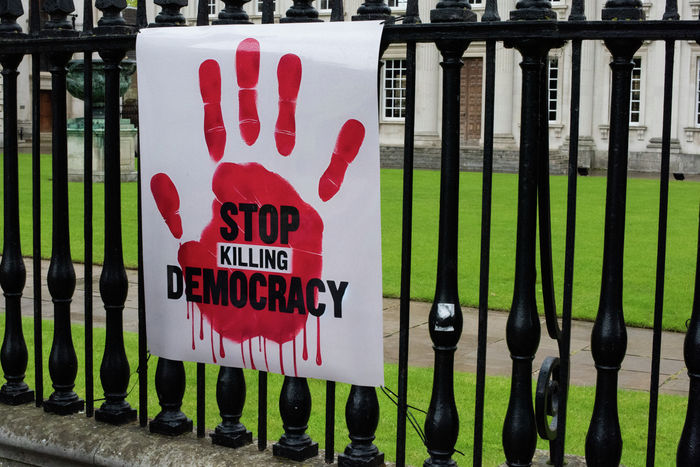Cambridge SU votes to support pro-Palestine encampment
The Students’ Union will donate all of its remaining council budget to charities supporting Palestinians

The Cambridge Students’ Union has voted to support the Cambridge for Palestine (C4P) encampment, following an emergency meeting last night.
The motion, which was passed in a vote, argued that the SU should formally recognise C4P’s demands, for the University to disclose and divest all investments in companies associated with Israel.
It also advocated for all of the SU’s remaining Council Free Budget (£1,250) to be allocated to charities supporting “Palestinians on the ground”.
It was also recommended that SU representatives on University committees discussing the conflict in Gaza should hand over their roles to student representatives elected through the C4P encampment.
The encampment was set up outside of King’s College last month. The group has said that they will not leave until the University discloses and divests all investments in companies associated with Israel, and reinvests this money into Palestinian causes, including students fleeing the conflict.
The meeting was triggered following a petition expressing concern over the rate of resignations from the SU, and concerns around the institution’s finances.
During the meeting, the proposer of the motion labelled the SU as “frankly embarrassing” and accused them of not making an effort to actively engage with the encampment.
They also claimed that the SU is not representative of the student body, citing the fact that four out of the eight elected sabbatical officers of the SU have resigned without being replaced.
During the meeting, multiple attendees complained that they had been blocked from entering the meeting with students claiming that the voting process was “flawed” and “really shameful”.
The SU’s BME officer Maroof Rafique was among such speakers, claiming to have been denied access to the meeting for the first 20 minutes. The chair of the meeting, Caredig ap Tomos, stated that this was “not intentional”.
Speakers against the motion claimed that the SU endorsing the encampment would “enable” and “legitimise” antisemitic rhetoric. A spokesperson for Cambridge Jewish Society (JSoc) stated that the motion went against the SU’s mission to “represent all students” and claimed that it would be “harmful and inappropriate”.
This was echoed by JSoc’s president, who stated that “there has not been a day gone by when I have not experienced antisemitism” since the encampment began.
Last week, JSoc endorsed the Union of Jewish Student’s “We’ve had enough” campaign, which claimed that antisemitism has “become a permissible form of hatred” since the October 7th attacks by Hamas.
Some speakers criticised JSoc in response, claiming that they did not have a mandate to speak on behalf of all Jewish students, and that they delegitimise the Jewish identity of any students who are not “staunchly pro-Israel”.
However, another speaker alleged that the encampment had platformed antisemitic speakers, claiming a teach-in, led by King’s College London academic Professor Adam Sutcliffe, and titled “weaponising antisemitism”, had denied the existence of antisemitism in the Israel-Gaza conflict.
Professor Sutcliffe told Varsity: “As a proud Jew and a historian of Jewish history, including the history of antisemitism, I find the suggestion that my teach-in session was in some way antisemitic absolutely absurd. We had an open and wide-ranging discussion at the encampment, and nobody was in any way silenced or marginalised.”
The meeting also discussed various motions tabled by Vareesh Pratap, SU postgraduate president, who is currently on hunger strike over alleged nepotistic and undemocratic practices within the organisation. He has called on the organisation to “stop killing democracy” and claiming that it has become had become a “quasi family business”.
One proposal tabled by Pratap alleged that a recent SU student trustees meeting was unconstitutional, due to a current undergraduate being elected to a postgraduate position.
This motion was not voted on at the meeting, after a speaker interjected with a proposition that the motion be shut down without a vote, which was successful.
Last week, Pratap was hospitalised after fainting during his hunger strike, but has since resumed his campaign.
Caredig Ap Tomos, the chair of the meeting and SU access officer, told Varsity: “As is standard practice elsewhere in the University, student members were required to join the meeting through their Cambridge University account in order to participate and cast their votes as attendees.
“We can confirm that no votes cast by students not in attendance were counted as part of the results, and all students who attempted to join through their University account were admitted, including those who switched to logging onto their accounts during the meeting,” he said.
“It was very welcome that hundreds of students attended the meeting, debated respectfully, and were able to vote on motions. As the motion to support the Cambridge Liberated Zone passed, the SU will now work with the proposers to implement the motion, of course while continuing to comply with all relevant legal requirements, and in accordance with the organisation’s democratic values.”
Cambridge for Palestine and Cambridge University Jewish Society have been contacted for comment.
 News / Downing investigates ‘mysterious’ underground burial vault 29 December 2025
News / Downing investigates ‘mysterious’ underground burial vault 29 December 2025 News / Unions protest handling of redundancies at Epidemiology Unit30 December 2025
News / Unions protest handling of redundancies at Epidemiology Unit30 December 2025 Lifestyle / Ask Auntie Alice29 December 2025
Lifestyle / Ask Auntie Alice29 December 2025 Features / ‘Treated like we’re incompetent’: ents officers on college micromanagement30 December 2025
Features / ‘Treated like we’re incompetent’: ents officers on college micromanagement30 December 2025 Science / Astronomical events to look out for over the break29 December 2025
Science / Astronomical events to look out for over the break29 December 2025










